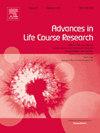Daily health and well-being among caregivers with multiple adverse childhood experiences: The role of family support and strain
IF 3.4
2区 社会学
Q1 Medicine
引用次数: 0
Abstract
Background and objective
Caregiving for aging parents is a prevalent experience for middle- and older adults in the US. Utilizing a life course perspective to family caregiving, this study examined the associations between providing care to parents and four daily well-being outcomes while also testing the moderating roles of Adverse Childhood Experiences (ACEs) and current family support or strain.
Participants and setting
Using data from the National Study of Daily Experiences 3, a daily diary project of the Midlife in the United States study (MIDUS), we analyzed a sample of 434 caregivers and their 1123 daily diary records. A multilevel modeling approach was used to examine intra-individual patterns.
Results
For caregivers who reported three or more ACEs, daily negative affect was higher on days they provided care compared to days they did not. For these caregivers, positive family support buffered the associations between daily caregiving to parents and higher negative affect, lower positive affect, and poorer sleep quality. Family strain exacerbated the effects of daily caregiving to parents on higher negative affect, lower positive affect, more physical symptoms, and poorer sleep quality.
Conclusions
ACEs may play a crucial role in contextualizing caregivers’ daily health outcomes. The findings of the current study enhance our understanding of adult-child caregivers who experienced multiple ACEs and highlight their need for trauma-informed support.
具有多重不良童年经历的照顾者的日常健康和福祉:家庭支持和压力的作用
背景与目的在美国,为年迈的父母提供照顾是一种普遍的经历。本研究利用家庭照顾的生命历程视角,研究了为父母提供照顾与四种日常幸福结果之间的关系,同时也测试了不良童年经历(ace)和当前家庭支持或压力的调节作用。参与者和环境使用来自国家日常经历研究的数据,这是美国中年研究(MIDUS)的一个日常日记项目,我们分析了434名护理人员的样本和他们的1123份日常日记记录。采用多层次建模方法检查个体内部模式。结果对于报告三次或三次以上不良经历的护理人员,提供护理的日子比不提供护理的日子每天的负面影响更高。对于这些照顾者来说,积极的家庭支持缓冲了日常照顾父母与较高的负面影响、较低的积极影响和较差的睡眠质量之间的关联。家庭紧张加剧了日常照顾对父母的负面影响,降低了积极影响,增加了身体症状,降低了睡眠质量。结论saces可能在护理人员的日常健康状况中起着至关重要的作用。本研究的发现增强了我们对经历过多次ace的成人儿童看护人的理解,并强调了他们对创伤知情支持的需求。
本文章由计算机程序翻译,如有差异,请以英文原文为准。
求助全文
约1分钟内获得全文
求助全文
来源期刊

Advances in Life Course Research
SOCIAL SCIENCES, INTERDISCIPLINARY-
CiteScore
6.10
自引率
2.90%
发文量
41
期刊介绍:
Advances in Life Course Research publishes articles dealing with various aspects of the human life course. Seeing life course research as an essentially interdisciplinary field of study, it invites and welcomes contributions from anthropology, biosocial science, demography, epidemiology and statistics, gerontology, economics, management and organisation science, policy studies, psychology, research methodology and sociology. Original empirical analyses, theoretical contributions, methodological studies and reviews accessible to a broad set of readers are welcome.
 求助内容:
求助内容: 应助结果提醒方式:
应助结果提醒方式:


